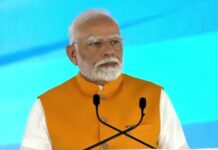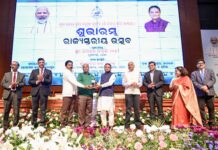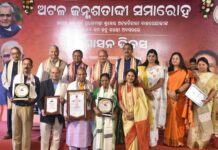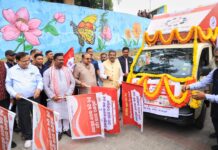By Our Diplomatic Affairs Bureau
NEW DELHI: India Prime Minister Narendra Modi and German Federal Chancellor Dr. Angela Merkel on Friday issued a joint statement after holding bilateral talks here.
At the invitation of Prime Minister Shri Narendra Modi, German Federal Chancellor Dr. Angela Merkel visited India from 31 October – 1 November 2019 for the fifth round of Inter-Governmental Consultations (IGC). Chancellor Merkel was accompanied by Ministers of Foreign Affairs, Science and Education, Food and Agriculture, and an Official Delegation. A business delegation comprising leaders of German companies also accompanied Chancellor Merkel. During the visit, Chancellor Merkel held meetings with President Ram Nath Kovind and Prime Minister Modi.
Chancellor Merkel and Prime Minister Modi reiterated that the Indo-German Strategic Partnership is based on the common values and principles of democracy, free and fair trade, and rules-based international order, as well as on mutual trust and respect. Key issues in the discussions included jointly driving the digital transformation through innovation and frontier technologies, especially artificial intelligence, making economic growth sustainable by cooperating on climate change, creating space for people to people contacts through legal mobility for skilled labour, and contributing to a reliable international order by strengthening and updating multilateral institutions.
Strengthening Cooperation in the Field of Artificial Intelligence and Digital Transformation. Recognising that AI will fundamentally impact the way the world lives and works in the coming years both sides intend to work together to foster, encourage and develop cooperation on AI technologies and thereby promote innovation and sustainable development.
Both sides reaffirmed the importance of building Digital Partnership to intensify regular interaction and coordination towards collaboration on the next generation technologies. India and Germany aspire to build a collaborative partnership by leveraging advantages on each side recognising increasing integration of hardware and software in developing IoT and AI solutions for societal benefits.
Both sides have drawn out their country strategies on AI and recognise its potential on research and innovation as well as on society in general. The potential synergies in focus areas such as Health, Mobility, Environment and Agriculture offer immense opportunities for enhancing cooperation and building on our comparative advantages. Germany and India intend to engage in further cooperation especially by fostering multidisciplinary research and development in AI by sharing expertise and best practices. The German Federal Ministry of Education and Research and the Department of Science and Technology, through the Indo-German Science and Technology Centre, agreed to organize a bilateral workshop in Berlin in 2020 in order to identify areas of mutual interest.
Recognizing that international cooperation has long been a key feature of cutting-edge research projects, Germany and India agreed on working together closely to conduct joint bilateral and/or multilateral research and development activities on the development and use of AI. This also includes cooperation between German and Indian companies which are part of the same global value chains. Both sides stressed the unique opportunity to enhance Indo-German collaboration in the area of AI for health. They welcomed the first stakeholder meeting in Berlin in September 2019 and agreed on facilitating another such meeting in India.
Both leaders welcomed AI collaborations in Agriculture such as precision farming with the aim to increase efficiency and to save resources as well as reduction of food losses and waste. Additionally, both Ministries of Agriculture aim to establish open training data sets for AI applications that also address legal issues. Both sides welcomed the Round Table with NITI Aayog and German companies of 30 September 2019 exploring opportunities for the application and upscaling of digital technologies and AI in agriculture in India, ensuring the participation of the private sector. Germany and India agree to share research on the complexities arising out of adoption of AI in the workplace and its impact on the economy and society through a joint workshop.
Germany and India want to foster business cooperation in the digital sector. Therefore German and Indian digital companies will jointly work towards further enhancing the scope of market opportunity and bilateral investments in each other’s countries and creating greater bonds between their thriving tech ecosystems.
Germany and India recalled the Joint Declaration in the Field of Digitalization – Empowerment and Economic Impact – signed on the 30 May 2017 in Berlin and agreed on broadening this Digital Dialogue. Both Sides welcomed the initiative of Indian and German business to set up a “Digital Experts Group” comprising of representatives of Research Institutions and private enterprises to identify areas for mutual cooperation and to give recommendations for future policy initiatives to be jointly considered by both sides.
Both sides agreed to create linkages between the German Platform Industrie 4.0 and the upcoming CII Smart Manufacturing Platform for cooperation and exchange of information including in standardization, IT-security in networked systems, testbeds and use cases, business models and B2B-platforms, and on topics shaping future digital ecosystems for Industry 4.0. Germany and India underline the importance of a rapid convergence of start-up ecosystems in both countries, welcoming initiatives that allow entrepreneurs to exchange ideas and share projects. Both leaders recognized the importance of fostering collaboration between Start-ups. In this regard, they welcomed the proposal to conduct Boot Camps for Start-ups which will help create an ecosystem for promoting innovation and fostering entrepreneurship in the digital area.
Both sides reaffirmed the importance of building an international forum to ensure the responsible and human centric development and use of artificial intelligence in accordance with international law. As such, Germany and India welcomed the opportunity to participate in the Global Partnership on AI (GPAI).
Germany and India agreed on consulting each other on identifying best possible approaches on cyber security and also device methods to identify areas of mutual cooperation in this regard.Expanding frontiers of Trade and Investment through Innovation and Knowledge
The leaders underlined their determination to enhance bilateral trade and investment. Both sides confirmed the importance of a balanced Free Trade Agreement between India and the EU and agreed to deepen efforts to restart negotiations between the EU and India on the Bilateral Trade and Investment Agreement.
Both sides reiterated their strong support for a rules-based international trading system with the WTO at its centre. Against this backdrop all efforts should be made to restore the full functioning of the WTO dispute settlement system and reform the WTO without undermining its fundamental principles such as Special and Differential Treatment, consensus based decision making and development objectives. To this end both Parties will strive to make the next WTO Ministerial Conference in Nursultan, Kazakhstan a success.
Both leaders appreciated the sustained growth in bilateral investments. They welcomed the success of the ‘Make in India Mittelstand’ (MIIM) Programme which has helped facilitate over 135 German Mittelstand and family-owned companies with a declared investment of more than 1.2 billion Euros. They also agreed to intensify efforts for an early conclusion of an investment protection agreement between the EU, the EU Member States and India. India welcomed Germany’s decision to reinstate its policy to grant investment guarantees for eligible direct investments by German companies in India as a means to deepen bilateral economic ties. The leaders appreciated the work of the Fast Track mechanisms which have resulted in a stronger business confidence.
Both leaders acknowledged the successful work under the German Indian Startup Exchange Program (GINSEP) in promoting the exchange between both startup ecosystems. They welcomed the continuation and strengthening of this important initiative via the new GINSEP programme as well as the introduction of a new German Accelerator (GA) programme “Next Step India”, which could lead to a full GA programme for German Startups in India.
The leaders recognized the importance of building an efficient pool of skilled human resources for creating sustainable livelihood and opportunities for the youth. Both sides expressed their willingness to intensify their efforts to bridge the gap between the demand and shortage of skilled work force.
In this regard, they expressed satisfaction at the on-going activities and welcomed the renewal of the Joint Declaration of Intent on cooperation in fields such as the establishment of cluster-oriented structures, curricula development, training of trainers and support for the development of Joint Training Institutes. Furthermore, both sides acknowledged their readiness to support skill development in new, innovative and sustainable technologies such as renewable energy, e-mobility and energy-efficiency and encourage the private sector of both countries to join in these efforts.
Both leaders appreciated the successful cooperation of more than a decade in the framework of the Manager Training Programme ‘Fit for Partnership with Germany’. More than 800 Indian managers have participated in the programme so far. They welcomed the continuation of the cooperation under this programme.
The leaders welcomed a further exchange of national initiatives on new forms of work with emerging new technologies. Furthermore, to advance in the eradication of child labour and forced labour including in global supply chains, they agreed to follow-up on the G20 strategy to eradicate child labour, forced labour, human trafficking and modern slavery in the world of work agreed on under the Argentinian G20 presidency.
The leaders highlighted the responsibility of business enterprises to respect human rights and reiterated their commitment to the UN Guiding Principles on Business and Human Rights and the G20 commitments on fostering sustainable supply chains. Both sides acknowledged that private sector can contribute substantively to meeting the Sustainable Development Goals (SDG), and expressed their wish to cooperate in supporting enterprises in conducting responsible and sustainable business practices. Both sides agreed on a further exchange of the experts and experiences especially regarding the establishment and implementation of the National Action Plans of India and Germany.
They also welcomed the signing of the Memorandum of Understanding in the field of Occupational Diseases, Rehabilitation and Vocational Training of Insured Persons with disabilities by the German Social Accident Insurance (DGUV), he Employees’ State Insurance Corporation and the Director General (Employment) under the Indian Ministry of Labour & Employment that will enable capacity building and social rehabilitation of Insured Persons with disabilities, besides prevention, detection and treatment of occupational diseases.
In the field of taxation both leaders welcome the recent progress on addressing the tax challenges arising from digitalization and welcome the endorsement of the ambitious work program by the G20 which consists of a two-pillar approach, developed by the Inclusive Framework on Base Erosion and Profit Shifting (BEPS) at the OECD and which will be finalized with a report by 2020. Germany and India emphasized their shared willingness for reaching a timely, consensus-based solution on both pillars 1 and 2 that will level the playing field for all businesses.
Both leaders welcomed the resumption of the Indo-German Finance Ministries Senior Officials’ Meeting which provides a forum for discussion and exchange of information and mutual economic interest. Prominent issues in this year’s exchange were, amongst others, the financial and insurance sector as well as the tax challenges arising from digitalization.
In the field of transport, both leaders noted the signing of the Joint Declaration of Intent on cooperation in the field of Civil Aviation that enables exchange of information and best practices as well as collaboration in technical and non-technical training. They also encouraged their respective business enterprises to enter into arrangements for co-development and co-production of commercial aviation in India, including transfer of know-how and technologies.
India and Germany have a long-standing and successful history of railway cooperation. The leaders appreciated the benefits that have accrued over the years through working together on training of Railway professionals and exchange of technical information in the areas of railway safety, high speed and semi high speed, which will continue in the future and can be extended. The leaders expressed satisfaction at the intention of both sides to arrive at a common understanding on future course of action for undertaking High-Speed and Semi-High-Speed-Rail-projects in India.
Both sides appreciated the close cooperation in the Indo-German Working Group on Quality Infrastructure based on the Joint Declaration of Intent signed at the IGC 2013. The two governments reaffirmed their commitment within the framework of bilateral technical and economic cooperation, and BMWi intends to support the Working Group beyond 2020 through its Global Project Quality Infrastructure (GPQI).
The leaders expressed satisfaction at the existing space cooperation between the two countries and welcomed the prospect of strengthening it further in areas such as earth observation and disaster management. They welcomed the signing of the Implementing Arrangement for exchange of personnel between Indian Space Research Organisation (ISRO) and German Aerospace Center (DLR).
Welcoming the Coalition For Disaster Resilient Infrastructure (CDRI), a global partnership of national governments, UN agencies and programmes, multilateral development banks and financing mechanisms, the private sector, academic and knowledge institutions, which aims at making systems and infrastructure resilient to achieving the objectives of the Sustainable Development Goals (SDGs), the Paris Climate Agreement and the Sendai Framework for Disaster Risk Reduction. Germany expressed support for the CDRI and announced its intention to join the CDRI formally while at the same time working with India and international partners for climate and disaster resilient and sustainable infrastructure investments.
The two leaders acknowledged their joint responsibility for the protection of the planet and mitigating climate change through enhanced promotion of renewable energy and increasing energy efficiency by at the same time reducing their carbon footprint,. For both countries, the Sustainable Development Goals and the Paris Agreement serve as guiding frameworks in their cooperation. They underlined that for a successful energy and transport transition in India and in Germany both countries need to closely cooperate, to learn from each other and to capitalize on the economic potential of climate protection.
Both leaders expressed grave concern about the currently inadequate global level of climate action and called on all countries to step up their efforts. Germany and India stress the need to undertake climate actions based on the principles of equity and common but differentiated responsibilities and respective capabilities, in the light of different national circumstances and agree to work towards further developing their respective NDCs as agreed in Paris.
In the same spirit, Germany as part of the European Union and India, strive to formulate and communicate long-term low-greenhouse gas emission, development strategies mindful of Article 2 of the Paris Agreement and given the recent findings of the IPCC, on the basis of equity, common but differentiated responsibilities and respective capabilities, in the light of different national circumstances, and in the context of sustainable development and efforts to eradicate poverty.
India and Germany highlighted the importance of a successful replenishment of the Green Climate Fund and encouraged developed countries and other countries in a position to do so to scale up their contributions or contribute for the first time to the Green Climate Fund over the course of its first replenishment period, in line with the provisions under the Paris Agreement and the UNFCCC. Both leaders affirmed their commitment to constructively work with all partners towards a successful COP25, including for the adoption of clear rules on market mechanisms that maintain environmental integrity, exclude double counting and safeguard sustainable development.
India and Germany have over 60 years of long-standing and successful development cooperation. The leaders appreciated the mutual benefit that has accrued to both countries over this period of time by working together in the areas such as energy, sustainable and climate friendly urban development and transport, environment and sustainable management of natural resources and the protection of biodiversity.
Both sides concurred that providing low-carbon and sustainable mobility solutions that serve the needs of all citizens is a key challenge of our time for both, emerging and industrialized economies. Germany and India have both taken important steps to create user-friendly and environmentally sustainable mobility schemes through a number of national policies and programmes.
Both sides agreed to foster cooperation on low-carbon mobility solutions and welcomed the signing of the new Joint Declaration of Intent on the Indo-German Partnership on Green Urban Mobility wherein the German side expressed its readiness to provide additional concessional finance of Euros 1 billion to support improvements of green urban mobility infrastructure and services and strengthen capacities of national, state and local institutions to design and implement sustainable, inclusive and smart mobility solutions in Indian cities. In addition, both leaders welcomed that e-Mobility is being envisaged an important area of collaboration, including under the already well established Joint Working Group on Automotive.
Recognizing the exceptional importance of both countries for a successful global energy transition in order to ensure the achievement of the long-term targets of the Paris Agreement as well as the SDGs in 2030, both leaders expressed satisfaction about the cooperation in the field of renewable energy and energy efficiency, including the important and successful work under the Indo-German Energy Forum (IGEF), Indo-German Development Cooperation as well as under the International Climate Initiative.
Both sides are committed to creating the necessary frameworks to promote the path for a sustainable substitution of fossil fuels, including coal. The focus of a sustainable energy transition shall be on large scale grid integration of intermittent renewable energy sources though enhancement of grid infrastructure, energy efficiency and demand side management, flexible power generation as well as large scale storage solutions. Furthermore, they recognized that there are several ways by which especially solar technologies could make a difference in the lives of people in rural areas, especially women, and agreed to explore possibilities to cooperate in this area, in particular to adopt storage cell and micro grid solutions for electrification.
They acknowledged the successful Indo-German Solar Partnership founded in 2015 and the cooperation on Green Energy Corridors established in 2013. In order to sustain the positive developments and to achieve the ambitious targets of the Indian government to provide 175 GW power from renewable energy until 2022 and 450 GW in later years and of the German Government to provide 80% of total power generation from renewable energy by 2050, both leaders agreed to promote a climate-friendly development of the Indian and German power markets.
India welcomed Germany’s keenness to join the International Solar Alliance (ISA), with a view to promote sustainable climate friendly and efficient energy solutions internationally.Prime Minister Modi and Chancellor Merkel reaffirmed the importance of the Indo-German Environment Forum (IGEnvF), which held its last meeting in February 2019 in Delhi. Taking into account the federal structure of both countries, participation of state and municipal authorities should be encouraged.
The two leaders further welcomed the meetings of the Joint Working Groups for collaboration in Water Management, Waste Management/Circular Economy and Climate Change as well as Biodiversity held in 2019. The leaders welcomed the launching of the initiative “Closing the Loop of Marine Litter in Ecosystem”. They expressed confidence that the initiative will support ongoing efforts to achieve SDG 12 by encouraging adoption of resource efficient and circular economy approaches, using technology-based solutions and in partnership with all stake holders. Both sides welcomed the signing of two Joint Declarations of Intent on Marine Litter.
Both sides agreed to dedicate a part of the Euro 35 million under the framework of the bilateral call of the International Climate Initiative to grid expansion and storage systems for renewable energy and a part to forest landscape restoration. New models for forest landscape restoration can contribute to India’s Bonn Challenge goal as well as to India’s goal to attain 33% forest cover. Both sides highlighted that forests are indispensable to safeguard the climate, to protect biological diversity and to contribute to sustainable development.
Both leaders expressed interest to continue and further strengthen the biodiversity cooperation as strategic partners for Convention on Biological Diversity (CBD) negotiations, including the post 2020 Global Biodiversity Framework. Both sides identified possibilities of cooperation in projects related to coastal and marine biodiversity conservation, conservation of pollinators, management of invasive alien species, ecological fiscal transfers and conservation of medicinal plants and other multiple use endemic tree species were further discussed.
Both leaders noted with satisfaction the progress achieved under the Joint Declaration of Intent on Sustainable Urban Development signed in May 2017 and reiterated their commitment to continue their successful cooperation They welcomed the signing of a Joint Declaration of Intent to formalize the participation of India within the International Smart Cities Network.
India invited German companies to participate in affordable housing programmes and promote exchange of new construction technologies in effective implementation of Construction Technology Year 2019-2020 in India. Both sides are looking forward to the next meeting of the Joint Working Group on Urban Development to take place in Germany 2020.
Both sides expressed their commitment to work towards the goals identified in the New Urban Agenda, at the Habitat III Conference in 2016. Both leaders appreciated the bilateral cooperation being implemented in the cities of Kochi, Coimbatore and Bhubaneshwar and agreed to expand the cooperation to more Indian cities.
Germany welcomes the endorsement of the Partnership Declaration on Collaborative Climate Action by the Indian state Chhattisgarh and encourages more Indian cities and federal states/union territories as well as the central government to join.
Both sides highlighted the constructive role of the Joint Working Group on Agriculture, Food Industry and Consumer Protection which held its last meeting in March 2019 in Delhi. They expressed satisfaction about the concrete projects emanating from the existing MoUs in the fields of food safety, agricultural training and skilling, post-harvest management and agricultural logistics. Both sides highlighted the opportunities for German companies in India in sectors of technology cooperation in farming and animal husbandry as well as food processing and supply chain management. They welcomed the prospect of a workshop on post-harvest management and agricultural logistics to be held in New Delhi in late 2019.
Both leaders appreciated the continuation of the fruitful cooperation in seed development, which was renewed by a Joint Declaration of Intent in June 2019, in order to contribute to promoting farmers’ access to high quality seeds. Both sides expressed their commitment to intensify cooperation in the field of agriculture and welcomed the signing of a Joint Declaration of Intent on the establishment of a new bilateral cooperation project which shall be designed to support reform efforts to strengthen agricultural market development in India.
In addition, the leaders welcomed the continued cooperation on sustainable management of natural resources, in particular soil and water.The leaders noted with satisfaction the existing strong cooperation in the field of culture and welcomed the Joint Declaration between German and Indian Museums, amongst others the National Museum, the Stiftung Preußischer Kulturbesitz (Prussian Cultural Heritage Foundation) and the Humboldt-Forum, regarding museum cooperation, preservation of cultural heritages and museum restoration.
Both sides welcomed the partnership agreement between All India Football Federation (AIFF) and the Deutscher Fußball-Bund (German Football Association, DFB) including cooperation in fields such as coach education, talent scouting and innovation technology.
Both leaders expressed their satisfaction with the plans for a German House at 2 Nyaya Marg, New Delhi, to accommodate the German Embassy School as well as the offices of state-funded institutions operating for the purposes of the Embassy’s commercial, economic, cultural and scientific department. They committed their full support to the state-of-the art construction project, designed to showcase the growing Indo-German technology partnership.
Both sides expressed their satisfaction at the growing exchanges between the two countries in the field of education, welcomed the “Indo-German Partnerships on Higher Education” (IGP) as part of the overall programme “A New Passage to India” (ANPtI) and agreed to take further steps to increase the number of Indian students studying in Germany, which presently stands at 20,800, and the growing number of German students studying in India. Simultaneously both sides recognized the importance of the promotion of teaching modern Indian languages in German educational institutions as envisaged in the Joint Declaration of Intent signed in 2015.
Both leaders expressed their appreciation for the long standing research partnership within the Indo-German Science and Technology Centre, IGSTC, which will celebrate its tenth anniversary in 2020. Both leaders also appreciated the University cooperation of TU9 and IIT, which is to be extended, as well as the Indo-German Centre of Sustainability.
In furthering cooperation in the field of research in traditional medicines, an MoU was signed between the Frankfurter Innovationszentrum Biotechnologie GmbH (FIZ) and the All India Institute of Ayurveda (AIIA), an autonomous organization under the Ministry of AYUSH, Government of India, that will promote collaboration in research and developing guidelines for integrating Ayurvedic principles with modern medicine.
Considering the role of traditional medicines, Ayurveda and Yoga in providing Healthcare to people for their well-being and also considering great role played by traditional medicine in primary healthcare in India, both countries agree to further evaluate the impact of traditional medicine, especially Yoga and Ayurveda for benefit of people. Bilateral projects, which identify areas for collaboration in education, research and practices of traditional medicine while ensuring the quality standards and also by encouraging investment in traditional medicine related infrastructure are highly appreciated.
Both leaders appreciated the institutionalisation of a regular Consular Dialogue Mechanism to address issues pertaining to all consular matters. Both sides agreed to hold the 1st India-Germany Consular Dialogue at an early date.
Both leaders took note of the satisfactory progress made towards finalisation of the Mutual Legal Assistance Treaty in Criminal Matters (MLAT). The leaders agreed that the two sides take forward the ongoing negotiations on Migration and Mobility Partnership Agreement between the two governments with a view to finalize the agreement at the earliest, based on the Statement of Intent on Key Elements of India-Germany Migration and Mobility Partnership Agreement.
The Indian side welcomed the intention of the German Federal Foreign Office to establish a Schengen-Visa-Centre within the German Consulate General in Mumbai from August 2020 which would further facilitate the issuance of visas.
Desirous of further developing and strengthening their Strategic Partnership, which will be entering its 20th year in 2020, both sides decided to institutionalise the mechanism of the Foreign Office Consultations to be held every calendar year between the Foreign Secretary of India and the State Secretary of the German Federal Foreign Office.
They also established a Track 1.5 Strategic Dialogue that will enable key stakeholders to engage annually in an open exchange of views and ideas to enhance mutual understanding of national, regional and strategic interests and to work out recommendations for joint engagement and action on individual policy areas. India and Germany commit to improve information flows between both countries by facilitating visits of Media professionals from both sides. Both parties underline the importance of free press for our democratic societies. Both leaders encouraged frequent and intense contact between parliamentarians and scholars. They recognized the role of the German political foundations in facilitating such contacts through educational and dialogue formats.
To contain the build-up of sovereign debt in developing and low income countries, while allowing adequate access to financing, both leaders underlined the importance of ensuring responsible, transparent, sound and sustainable financing practices for borrowers and creditors, both official and private. Against this background India and Germany support the ongoing work by the International Monetary Fund, the World Bank Group, and the Paris Club (PC) on low income countries debt and the continued efforts of the PC towards the broader inclusion of emerging creditors. Both sides reaffirm the PC’s role as the principal forum for restructuring official bilateral debt and support its work on sovereign debt issues.
India and Germany acknowledged the need to further deepen bilateral defence cooperation as strategic partners to jointly address global and regional security challenges. Germany will work towards facilitating export of military equipment as well as technology sharing with India according to relevant international, European and national rules.
A deeper cooperation between the Defence Industries of both countries must encourage co-development and co-production, under the Government of India’s Make in India initiative and take advantage of the defence corridors set up in the States of Tamil Nadu and Uttar Pradesh. Maritime projects between the Indian and German naval industries (e.g. submarines) are encouraged in view of the shared interest in the stability of the Indian Ocean region. Both sides agreed to develop stronger cooperation in Defence Industry testing and certification, especially for design certification of various systems and sub-systems and quality assurance. The two sides also agreed that major industries of both countries should endeavour to integrate the SME/MSMEs of the other country into their supply chains.
The two leaders welcomed the decision to conduct regular Dialogue between the Defence Ministers of the two countries, alternately in India and in Germany, at least once every two years. Both leaders welcomed the “Implementing Arrangement concerning Bilateral Defence Co-operation” signed earlier this year and expressed the hope that this will provide impetus to cooperation in security policy in existing and new defence and security dialogue formats. Besides the focus on global, regional, Maritime and Cyber Security, an extended and deepened cooperation in the domain of UN-Peacekeeping training will be mutually beneficial subject of the regular high-level and experts consultations.
On his 150th anniversary, both leaders paid tribute to the lasting legacy of Mahatma Gandhi and to his philosophy of non-violence and harmony. They reiterated their commitment to promote shared values such as democratic governance, the rule of law, respect for human rights and fundamental freedoms, and multilateral cooperation, based on purposes and principles of the UN Charter, including equality, sovereignty and territorial integrity of all countries.
Both leaders affirmed their commitment to the protection of human rights and fundamental freedoms and to strengthening domestic and international mechanisms to defend them. India and Germany are committed to close cooperation, bilaterally and with partners, in the G20, the United Nations and other multilateral forums, to address existing and emerging challenges to international peace and security, global economic stability and growth. In this respect, India and Germany particularly look forward to close cooperation during the Indian G20 Presidency and the German G7 Presidency in 2022.
Both sides underlined the importance of unimpeded commerce and freedom of navigation in accordance with International Law, notably the United Nations Convention on the Law of the Sea (UNCLOS) 1982.
Both leaders reiterated their commitment to a stable, united, prosperous, pluralistic and peaceful Afghanistan. India welcomed Germany’s efforts at co-organizing an Intra-Afghan Dialogue that includes the Government and ensures a comprehensive and inclusive Afghan-led and Afghan-owned peace and reconciliation process.
They called for a cessation of violence; breaking of all ties to international terrorism; dismantling of terrorist safe heavens and sanctuaries; preservation of the Constitutional order and the respect for the universal human rights of all Afghan citizens as enshrined in the Constitution. Germany appreciated India’s contribution in development cooperation and rebuilding of Afghanistan. The leaders underlined that the Heart of Asia-Istanbul process as well as the International Contact Group for Afghanistan remain important formats for regional and international confidence building and political cooperation.
Emphasising that terrorism is a global scourge the two leaders expressed their strong concerns on global threat of terrorism and their resolve to jointly combat it. They called upon all countries to work towards rooting out terrorist safe havens and infrastructure, disrupting terrorist networks and financing channels and halting cross border movement of terrorists.
They emphasised the need for stronger international partnership in countering terrorism and preventing violent extremism, including through increased sharing of information and intelligence and in full compliance with the rule of law and international law, including human rights law and international humanitarian law.The leaders underlined the need for all countries to ensure that their territory is not used to launch terrorist attacks on other countries in any manner.
The two leaders stressed the importance of the combined effort of all countries to fight global terrorism and to send out a consistent message that terrorism in all its forms and manifestations is not acceptable to the international community. Referring to the need for presenting a united front in the fight against this global menace, the two leaders called for the finalisation and adoption of the Comprehensive Convention on International Terrorism (CCIT) in March 2020.
Both leaders agreed that India and Germany must continue their cooperation within the framework of the Joint Working Group on Counter-Terrorism, including on information and intelligence sharing on terror networks and work together to share experiences on dealing with the growing phenomenon of radicalisation. They asked officials on both sides to schedule the next meeting of the Joint Working Group on Counter-Terrorism at the earliest.
India and Germany reaffirmed their support for the continued full implementation of the Joint Comprehensive Plan of Action (JCPOA) signed between Iran and the E3+3. The issues that have arisen around it should be resolved peacefully through political dialogue. India and Germany agreed that full compliance with the Joint Comprehensive Plan of Action (JCPOA) on the Iranian Nuclear Programme and the UN Security Council Resolution 2231 was needed to ensure regional and international peace and security and that current issues need to be resolved peacefully through dialogue and confidence building, including through efforts towards de-escalation of ongoing tensions.
The leaders expressed their commitment to strengthen global non-proliferation efforts. India thanked Germany for its support for India’s accession to the Missile Technology Control Regime, Australia Group and the Wassenaar Arrangement. Germany reiterated its steadfast support for India’s early accession to the Nuclear Suppliers Group (NSG) and in this context recalled the importance of India’s constructive engagement in the areas of nuclear non-proliferation, disarmament and arms control.
The two leaders underlined the steadfast efforts of the G-4 and other reform-oriented countries and groups in moving towards initiation of text-based negotiations on the Security Council reform to be initiated during the 74th session of the UN General Assembly. Both countries reiterated their full support to each other’s candidatures for a permanent seat in a reformed and expanded UN Security Council. Reforming the Security Council is central to safeguarding and strengthening the multilateral rules-based order. The lack of representativeness of the Security Council at the heart of the international order for international peace and security affects the legitimacy of its decisions and its effectiveness. In light of the global challenges we are facing, we need strong, legitimate and effective United Nations.
Strong and effective multilateral cooperation is key to secure peace, stability and prosperity. Major challenges of our time, by their nature and global scope, cannot be addressed by countries separately but must be tackled jointly.
Both leaders expressed satisfaction at the deliberations held at the 5th IGC and reaffirmed their commitment to further strengthen the Strategic Partnership and resolved to continue to synergise their approaches towards issues of regional and global importance. German Federal Chancellor Dr. Angela Merkel thanked Prime Minister of India Narendra Modi for his warm hospitality and for hosting the IGC.






























